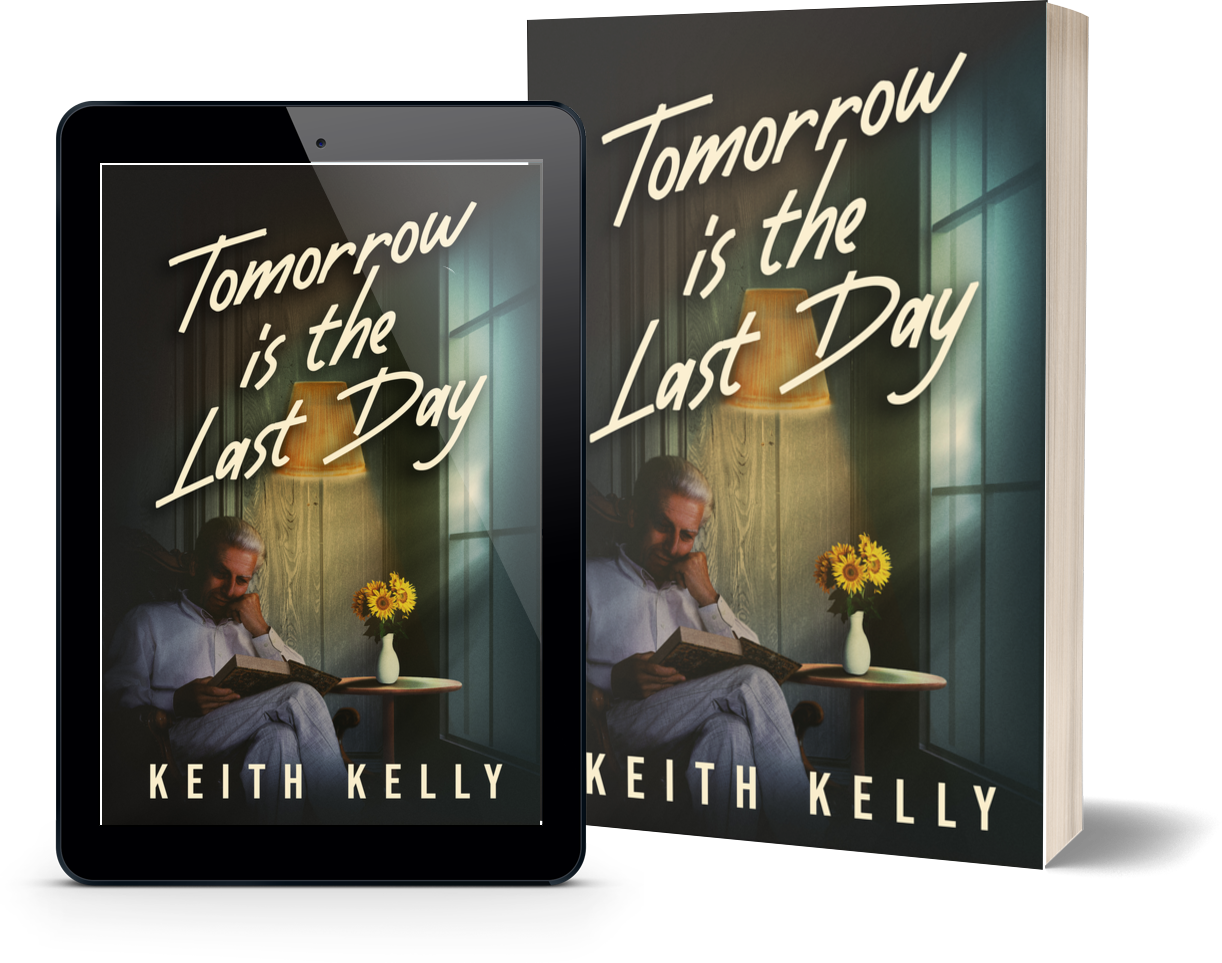Tomorrow Is The Last Day
Book summary
In "Tomorrow Is The Last Day," Chad Owens, a man with a lifetime of ups and downs, faces retirement with a reflective heart. As he navigates memories of an imperfect past, he grapples with the need to embrace every aspect of his life, including the pain and disappointments, in order to move forward into the next phase of his existence. This introspective journey explores the profound truth that tomorrow is never promised.
Excerpt from Tomorrow Is The Last Day
“Does your wife know the good you do here, Chad?” Jerry asks me before the Recovery Tools class begins.
I turn and look at him. Damn, in all my years of counseling, nobody has ever asked me this question.
“Well, Jerry, I honestly don’t know, but I’ll ask her.”
The addiction business is quite misunderstood, unless you work in the field, like I have done for so long. The average person doesn’t know what it’s like to live with an addiction. It’s a disease, but for someone who doesn’t work around it every day, it’s something they don’t comprehend.
I don’t blame people for not understanding this disease. If I didn’t work in the field, I probably wouldn’t either.
After a discussion with this young man, I think about how the average person doesn’t understand the life of an addictions counselor either. To begin with, I spend a ridiculous amount of time on useless paperwork that pulls me away from my hands-on work with patients. I constantly fight with insurance companies to keep them paying for a patient’s stay in the facility. It pisses me off how people pay their insurance premiums, and when they need the benefits the most, it doesn’t cover shit, and to top it off, the insurance companies don’t care.
Those fucking bastards!
Myself, as well as every other counselor in the field, are the ones who must go to the patient and tell them they have to leave the program because their insurance company won’t pay for more. This is after meeting with administration to see if any funding is available. The answer is always no, so I end up talking to the patient and breaking the news.
Meetings are another part of my job, which consists of two or three a week. Clinical team meetings can last up to two hours, discussing budget, funding cuts, and complaining about everything. If any time is left, patients are discussed. At best, twenty minutes is spent for thirty of them.
An addictions counselor also attends an unbelievable amount of training classes to keep up with continuing education units. These are an incredible waste of time and money where I learn nothing. Most of the time, I find people ask stupid questions just to listen to their own voices. Then, we have the actual treatment for the patients, such as groups, classes, and individual counseling sessions. In all of my years of alcohol and drug counseling, I have heard every horrific story about the human condition.
Drug use, drug abuse, misuse, and excuses, you name it. Once I’ve heard their story, my job is to dig deeper into why a patient has been using drugs in the first place. This is when the story gets quite grim.
Some patients have suffered rape, committed murders, seen murders, seen rapes, have been molested, and have been perpetrators. Girls raped by their fathers, mothers, brothers, sisters, aunts, uncles, and cousins, with ice picks, coat hangers, all sorts of other instruments, and beaten with water hoses. Boys penetrated anally by their fathers, brothers, uncles, and cousins, resulting in blown out anal sphincters.
Parents have taught their children how to shoot up, smoke, and snort drugs, as well as shoplifting, killing, stealing, and raping. Generational drug use is passed down to the patient, starting with the grandparents or even further back.
The stories wear me out. They wear the counselors down in the long run. It’s common to want to hug the patients and comfort them, but it’s considered inappropriate. It’s common to want to continue to help them after they leave the facility with further counseling, but it’s unethical. Patients have to be referred to an outside therapist.
Many times, I say to a patient, “With your story, no wonder you use drugs. Shit, I would, too.” How these people survive amazes me.
The hardest thing I contend with, which causes me so much frustration, is when I see so much potential in a patient and they don’t see it in themselves because of their low self-esteem. I’m excellent in helping individuals to realize and find their self-esteem. Even more frustrating is when my patients have potential, but they have no wish to change their negative lifestyles.
The generational drug use that’s passed down to them leaves these individuals not knowing what else they’re supposed to do. Using is all they know. It can make any counselor resentful toward the parents. In most cases, the patients are a product of their environment. Not to say it isn’t up to them to change their circumstances, but they didn’t ask to be born and raised in the chaos that surrounds them.
Every patient is a case-by-case basis. Many years of days like this have come and gone. At night when I go home, I can’t tell anyone of what’s transpired throughout the day because it’s considered unethical. Thus, I’m left alone to deal with the fallout and all of my emotions.
***
Tomorrow is August 12, 2037. My name is Chad Owens. I’m retiring from a forty-year career as an alcohol and drug abuse counselor. Thankful for my success, I’d planned to retire by the time I’d turned fifty, but that didn’t happen. I’ve wanted to make a living at being a writer or a musician.
Tomorrow, I assume they’ll have a luncheon and give me a token gift, like most companies do. That’s okay with me. The company has treated me quite well over the years.
I sit in my living room this evening in my favorite chair, looking out into the night, feeling blessed. Sipping warm milk, I have to say I’m content.
Most of my life, I’ve been a counselor by trade. I’m also a writer. I’ve practiced this craft all my life. Fortunately, I’ve embarked on a decent career late in life with poetry, short stories, and several novels under my belt. I’m an active and healthy sixty-seven-year-old man with a wonderful wife, stepchildren, and a grandson, which I consider to be immense blessings.
I’ve one regret, however—the fact that I’ve spent the last forty years in this field without intending to do so. Hell, if I’m honest, I fell into it and have spent most of my time dealing with other people’s problems.
Growing up, I remember Daddy wearing a suit every day to work. I’d known back then that I didn’t want a job where I had to do the same. Most of my life, I’ve sported long hair, although it hasn’t always been this grey. I’ve never paid much attention to what I wear either.
My mom and my brother were addicts. Dad was a codependent enabler who turned his back on every problem within our family. At work, he faced problems with bravery, not being scared of any situation the business world threw at him. Other than that, he had a living problem, that being he didn’t know how.
This is why I say I’ve fallen into the field. In my experience as a counselor, people raised in dysfunctional families fall into careers such as counseling. Never choosing it, it chooses them.
I went to college at the University of Texas, and the only classes I found interesting and made good grades in happened to be Psychology and Sociology. Everything else I had to study hard to make average grades. My major is in Psychology with a minor in Sociology. This degree looked like it was meant to be and natural.
Looking back through my career, I realize many people in the counseling field are fucked-up worse than their patients. I’m so used to being around fucked-up people that I find myself comfortable around them. Maybe this means I’m fucked-up, too.
College had been hard for me. The first time I’d attended, I partied and flunked out. The second time, I paid for my education by selling drugs and working at a part-time job.
Once older, I became serious about my education. My classes were difficult. I studied so much to keep up, I never had time for a social life. I’d made a couple of friends I would go to ball games or play tennis with, but for the most part, all I had time for was to go to school and work.
As much as I hate to admit it, more often than not, I feel I’ve wasted so many years and creative talent in this field. The work comes so naturally to me. It has never been a challenge.
It’s common sense, for the most part. Don’t get me wrong, I’m thankful for the years of work without layoffs or firings. It’s been a blessing. I’ve made a decent living, and I never live check to check.
Counseling is an art, not a science. I don’t see myself as a counselor, however. I see myself as a writer, and then a musician. And I am good at it. Good enough for me, anyway.
The patients love to hear me play and read my writing. I’ve worked with thousands of people over this forty-year span. In general, they like me, and I never have many problems with most of them. They often share how they think I’m an excellent counselor in helping them change their lives.
My pride lies in comments on my writing or music, because that’s what is the most important to me.
***
On a Monday morning, in September of 1994, I’d begun my counseling career at Valley Pointe Hospital. Upon walking into my first treatment unit, it hadn’t taken me long to learn it was going to be a rough and violent job. The hospital was a locked facility for at-risk boys and girls from the inner city of Dallas.
Earlier that May, I’d completed my Psychology degree. It qualified me for the position I’m now in. The starting pay had been eight dollars an hour, which was okay at the time.
I’d walked up to the fourth floor, almost turning and walking out shortly after arriving. A long-term unit where kids from twelve to eighteen years of age resided from three to eight months, it housed the roughest kids.
My job title was Mental Health Technician, and my duties included maintaining order on the floor. If a kid got out of line, my job was to correct him or her, and put their ass back in line through a series of interventions known as Crisis Intervention Prevention. The first step was talking them down from their anger, and then redirecting them. If that didn’t work, we dropped their asses to the floor.
Within a couple of months, I came to realize the shit I’d learned in college was irrelevant when it came to the actual job. This had been in the early nineties. Forty years later, I still feel the same way. Not one piece of information I’d learned in college, in any licenses, or formal trainings, did I ever use on the job.
Mr. Simpson, my first trainer in the field, had been an excellent MHT. The kids, both boys and girls, respected him.
“Be firm, fair, and consistent,” were the first words he ever said to me.
Little did I know, those words would be recurrent throughout the life I’ve led. Those three words were the keys for survival in this field.

















Praesent id libero id metus varius consectetur ac eget diam. Nulla felis nunc, consequat laoreet lacus id.